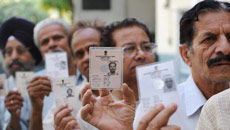The Supreme Court Thursday said the national auditor CAG can audit telecom operators' account books to ascertain whether the government was getting its due share from service providers to whom it given the scarce natural resource that belongs to the people.
A bench of Justice K.S. Radhakrishnan and Justice Vikramajit Sen said: "CAG's function is only to ascertain whether the Union of India is getting its due share, while parting with the right to deal with its exclusive privilege to the service providers, who are dealing with a national wealth."
Justice Radhakrishnan, speaking for the bench, said: "The service providers are bound to make available all the books of accounts and other documents maintained by them under Rule 3, so as to ascertain whether the Union of India is getting its full share of revenue."
The court said while upholding the Delhi High Court order that CAG could audit the account books of service providers and dismissing a appeal by the service providers challenging it.
The court said that CAG is entitled to seek the records of the service providers and by doing so its was not actually auditing their accounts but "examining all the receipts to ascertain whether the Union is getting its due share by way of licence fee and spectrum charges, which it is legitimately entitled to, by way of revenue sharing".
Service providers are, therefore, bound to provide all the records and documents called for by the CAG.
"CAG has, therefore, a duty to examine and satisfy himself that all the rules and procedures in that behalf are being met not only by the Union but also the service providers as a whole, since both, the Union, as well as the service providers, are dealing with the natural resources," the court said.
"CAG's function is only to ascertain whether the Union of India is getting its due share, while parting with the right to deal with its exclusive privilege to the service providers, who are dealing with a national wealth, to that extent, Rule 5(1)(ii) has to be read down" but the service providers are bound to make available all books of accounts and other documents maintained by them under Rule 3.
The court said this while addressing whether CAG audit was only limited to the finances of the government and its instrumentalities and did not extend to the account books of private entities. "We may point out that this is the prime question that arises for consideration in these appeals," the court said.
"We are of the considered view that when the executive deals with the natural resources, like spectrum, which belongs to the people of this country, parliament should know how the nation's wealth has been dealt with by the executive and even by the UAS Licence holders and the quantum of the revenue generated out of the use of the spectrum and whether the same has been properly assessed, collected and accounted for by the Union and the UAS Licence holders," the judgment said pointing to the doctrine of parliamentary accountability.
"When nation's wealth, like spectrum, is being dealt with either by the Union, State or its instrumentalities or even private parties like service providers, they are accountable to the people and to the parliament. A parliamentary democracy also envisages, inter alia, the accountability of the council of ministers to the legislature," the judgment said.





